structural determinism


We implicitly trust that things will operate according to how they are made. Things can only act in a way that they have the right “shape” for. This includes, of course the way the parts of that shape operate or work together; for example a casting of a bicycle won’t work as a bicycle. Thus also the “flying puppet” in the photo cannot really fly even though it has wings, but of course the moth can. This notion was given a name, structural determinism, by Maturana.
As Maturana points out, we usually don’t pay attention to the full implications of structural determinism. For example when we press a light switch, we think in terms of “turning on the light.” We are used to the action of something being predictable so we tend to think in terms of causality. Yet if we toss a frisbee, and it doesn’t fly right, we are not likely to blame the structure of the frisbee, we do know that we need to flick our wrist the right way. Or for that matter, we don’t think we should be able to speak to an ordinary light and expect it to turn on.
Maturana often tells this in the form of an anecdote: if you press a switch that should turn something like a radio on, and the radio does not turn on, you don’t go to the doctor to find out what is wrong with your finger. You take the radio in for repair. So we do know mechanical and other made things operate according to how they are made.
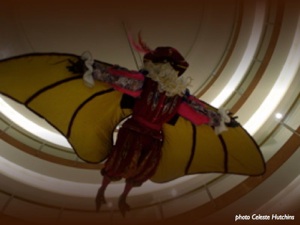

structure-determined systems
“Structure-determined systems are systems, or composite entities, such that everything that happens in them or to them is determined in them at every instant by their structure and structural dynamics at that instant. External agents that may impinge upon a structure-determined system only trigger in it structural changes determined in its structure without specifying them. A structure-determined system, therefore, has a structure that changes following a course contingent to the course of its interactions, and whenever in the course of our living we see or live a situation that seem to violate structural determinism, we are astonished.
Magic shows play with our trust in structural determinism by creating situations in which it appears to be violated but is not. If structural determinism seems to be violated in any circumstance of daily life, we immediately attempt to explain what happens by thinking that something is wrong in the sense that something different from what was expected is happening, that there is a fraud, that some one is cheating, or, in the extreme case, we resort to the notion of miracle to express our astonishment.”
Origin of Humanness in the Biology of Love, page. 160

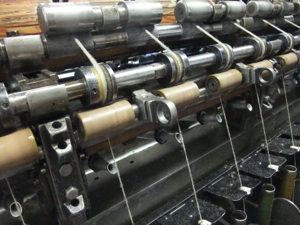
So far, obvious - we’re talking about “things” - and we can by extension realize that structural determinism is also the case at molecular and sub-molecular scales, or at cosmic scales. We accept that stars and planets operate according to their structure. Where it is less obvious is with the behaviour of living systems, particularly people.
Of course we can’t fly as we haven’t got wings etc. -- nor can we do so no matter how much someone insists that we do that. Of course we cannot see if we have been blinded by some accident. But less obvious to most is that we cannot specify what someone will understand when we speak to him or her. We cannot determine what will happen in the intricate dynamic structure of anyone’s nervous system.
Humans, too are structure determined systems; it’s just that the structure of our cognitive system is so richly intricate and so dynamic, with such an inherent capacity for coherence both internally and with the world, that we can and do co-ordinate with each other. We live as if we understand each other. Put differently, understanding each other does not imply that either person is determining what happens to the other.
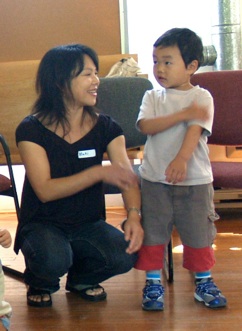
pre-determinism
So... if the universe consists of structures that can only act in every moment according to how they are made at that moment, how is it that everything is not prescribed or pre-determined so that it will happen exactly one way, and not any other way?
Sometimes it does feel like that. We easily speak about “it was fated to happen” or “this is my destiny”. I think such comments are really based on a sense of congruence, ie. that things are happening in accord with all the relevant connections, each with its own history. We grasp such a coherence, and cannot explain it because much of it is neither explicit nor specified in language. (In order to distinguish something, or to reflect on what we have distinguished, we must operate in language... more on that in the section on languaging.)
I will try to explain the difference between structural determinism and pre-determinism with this little diagram.
The little person in the bottom is living his life along a prescribed path. He* has no choices, even if he has the illusion of making a choice - everything is happening according to some cosmic plan. The story that he tells is one where what he did was just as it was meant to be. His life, and the moment o his death, is predetermined.
The person in the top lives the same life path, but there are many happenings that impinge on his life, and at each moment he could respond one way or the other, and that changes not only the course of his life, but what else he will encounter. The story he will tell about his life is about the choices made; even if he is mostly unaware of the significant minor shifts he makes until they evolve into discernible differences. The story of his choices reveals only what he has distinguished as happenings.
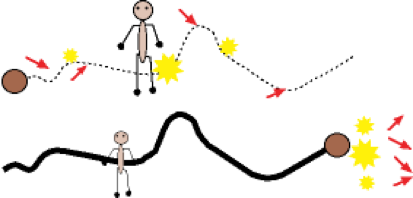
* I’m using “he” as a grammatical convenience only. In my native language, Estonian, there is no gendered pronoun. Everyone is “tema” or “ta” for short.
The unpredictability of happenings can be argued, or rationalized, according to quantum mechanics; i.e. at the smallest level of resolution that physicists have been able to discern, things seem to happen randomly, though within the constraints of their structural coherences. Small quantile effects can propagate upwards into larger systems and come to generate differences that are discernible at our own scale. This is a little like the unpredictability of weather. We can say that the flutter of a butterfly in Tokyo can cause a hurricane in the Caribbean. However, we do not need to fear butterflies as the source of hurricanes. Systems are well buffered, and it is only in extremely rare instances that the upward propagation of influences can be attributed to any one source. “Upward propagation” is a matter of unlikely alignments in space and time, at all scales.
For humans, living in language, there is yet more flexibility in what happens. Language has a structure that is not necessarily rigidly connected to the structures of the medium. We can imagine or believe various things, and act according to what we imagine or believe to be the case. We can even make tangible that which we imagine. And it is in language that we can imagine a choice.
What fascinates me is that it is not necessarily in the actual making of a choice (say between doing x or doing y) that we are expressing our autonomy. The very act of conceptualizing the possibility of a choice has already altered the structure of our nervous system such that we are no longer the same being as before we reflected. The apparent right direction may appear to arise just from stepping back and reflecting.
I claim the process of reflection is what creates a space for the experience that we know as “free will”.
More, much more, on this as we discuss language!
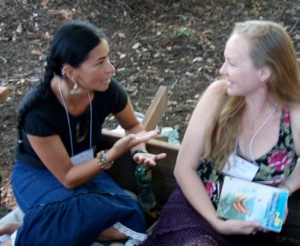
bramble
How the light or the frisbee responds depends on how it is made.
What it does depends on its structure. We can sometimes trigger the changes we want if we act appropriately with the structure of something. In the case of the light, the designers have created the whole system (light bulb, wiring, switch, and delivery of electrical potential) so that flicking the finger on the switch interacts with the light in a predictable manner.


Olga Reznik,
Flickr Creative Commons
Amodiovaleri Verde,
Flickr Creative Commons
